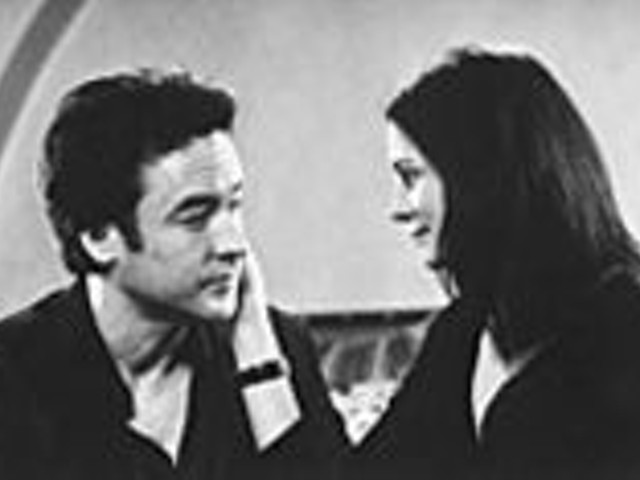But just because Jurassic Park III has several obvious flaws doesn't mean it's a complete waste. For one thing, director Joe Johnston, who previously made even the most benign animals seems frightening in the kids' horror flick Jumanji, has loaded the film with some truly malevolent beasties. Whereas The Lost World one-upped the T. rex simply by introducing more T. rexes, Johnston digs up the spinosaurus, the largest carnivorous dinosaur known to exist and bona fide king of the jungle bad-asses, as proved early on by the fact that it snaps a T. rex's neck. Although you'd suspect that such a creature must have been invented for the movie, it is based on real fossils, but because no complete spinosaurus has ever been found, there's room for creative license. It's unfortunate that the TV spots have repeatedly displayed the creature's look; the film's slow revelation of it is very nicely done.
Johnston has also performed a valuable service for fans of Michael Crichton's books: He finally stages the pterodactyl sequence from the first book, and it's worth the wait. For the sake of visuals, there's some creative fudging here -- the giant pteranodons used in the film are generally believed nowadays to have had feathers and to have been smaller and more or less looked like large pelicans, whereas these are massive leathery reptiles with a taste for human flesh. Not that it really matters, because, um, dinosaur cloning isn't exactly based on reality, either.
It's almost a shame that there has to be a script at all, but once again the studio suits have decided that there needs to be some kind of reason for people to get trapped on an island full of dinosaurs yet again. As if anyone cares. At least scribes Peter Buchman, Alexander Payne and Jim Taylor have the decency to treat this film like a real sequel and pick up where the first film left off (this is more of a proper sequel to Jurassic Park than The Lost World ever was). Alan Grant (Sam Neill) has broken up with Ellie Sattler (Laura Dern) and is hard-pressed to get people interested in his fossil research anymore because the existence of real live dinosaurs is more fascinating (Jeff Goldblum's Ian Malcolm is glibly written off with the remark "Seems like the guy was kinda high on himself"). So, not 10 minutes after he has uttered the phrase "No force on earth or in heaven could get me on that island," he's back on the island, hired by alleged entrepreneur Paul Kirby (William H. Macy) and his ex-wife (Téa Leoni) on the pretense of an adventure flight over the island. In fact, the Kirbys are looking to rescue their son Eric (Trevor Morgan), who may have landed there after a parasailing mishap involving some really fake blue-screen effects.
That's enough plot. The rest is a series of set pieces, as Grant and the Kirbys (who soon reconcile as a couple -- nothing like the threat of being torn apart by lizards to rekindle the ol' marriage flame), along with various other characters so disposable they might as well be wearing red Star Trek uniforms, make their way to safety through dangerous terrain, stalked by the spinosaurus, pteranodons and, of course, those old favorites, the velociraptors.
Although there are some nicely humorous moments that are mostly unexpected (Grant has a dream in which a dinosaur talks to him; Paul Kirby refers to the spinosaurus as the "tricycloplotz"), the script frequently shows its seams. The ending in particular is weak and abrupt, involving a character's suddenly knowing something that he explicitly did not know before, apparently as a result of sheer dumb luck. At times it feels as though the characters and the dinosaurs are actively trying to ignore the script; when certain items are established for use later on, the payoff is so ho-hum that one wonders why they bothered (the exception is a neat cell-phone gag, which is on a par with the rearview-mirror gag in the first film). Other items appear to be being set up for later payoff , then completely ignored, notably the secret origin of the spinosaurus, and a big beaker of tyrannosaurus urine that serves no purpose beyond its being urine and therefore inherently funny. And the raptors seem to be inserted just because of some kind of contractual obligation; their menace swiftly wears thin (or maybe it's because a 10-year-old girl kicked their butts with gymnastics moves in the last film).
At its best, Jurassic Park III is eerily similar to some of the more recent dinosaur-themed video games on the market. Scenes set in an abandoned science facility could have been taken straight out of Capcom's Dino Crisis. And a sequence in which a character must jump across several stone pillars protruding high up from the water and immersed in mist are a direct crib from the N64 hit Turok. It should be noted that, like those games, this film may not be suitable for very young viewers: One scene in which a child is nearly pecked to death by baby pteranodons is particularly likely to inspire nightmares.





